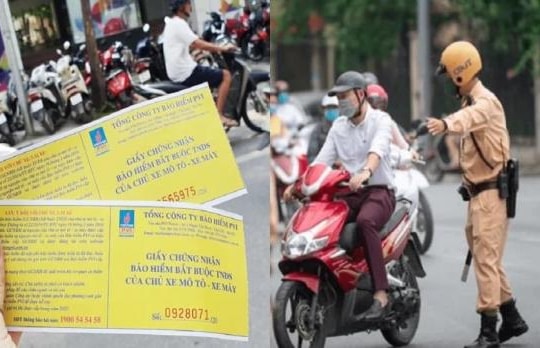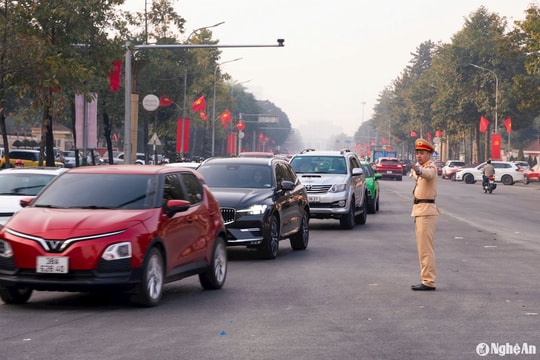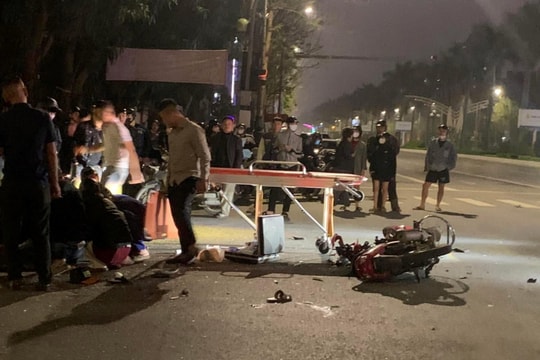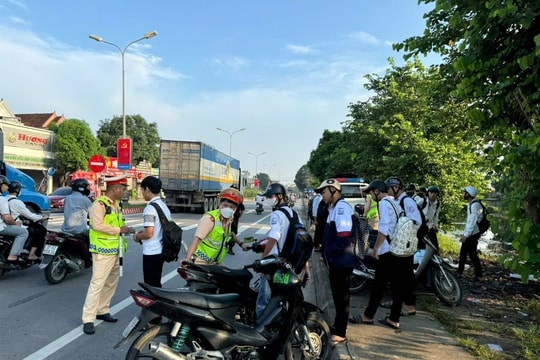Traffic police have the right to requisition vehicles and property.
People who object to requisitions can be arrested. In cases of wrongful requisitions, people have the right to sue and be compensated for damage to their requisitioned property.
“Circular 01/2016 of the Ministry of Public Security stipulates the duties, powers, forms, and contents of patrols and controls of traffic police, replacing Circular 65/2012 from February 15 without major changes. Circular 01 is regulated more concisely and condensed, and some points are added to make it suitable after the Road and Railway Traffic Police Department and the Waterway Traffic Police Department merged into the Traffic Police Department.”
On January 29, Lieutenant Colonel Nguyen Quang Nhat (photo), Head of the Department of Propaganda and Dissemination of Law - Traffic Police Department (Ministry of Public Security) said.
No increase in power for traffic police
- Reporter:Circular 01 adds a provision allowing traffic police to “handle administrative violations in other areas of state management”. What are these other areas and does the new provision add more power to traffic police?
 |
+ Lieutenant Colonel Nguyen Quang Nhat:The new circular’s additional provisions are consistent with the regulations on administrative sanctions. Accordingly, all administrative violations must be detected, prevented promptly and strictly handled. Therefore, not only the traffic police but also other functional forces have this right.
However, the handling may stop at recording the violation or immediately applying measures to prevent acts causing serious consequences and ensuring security and order.
All such cases must be recorded to record the consequences of the violation. After recording the record, the traffic police will hand it over to the competent authorities for further handling.
In fact, such cases are quite rare, when it is not possible to call the specialized forces immediately. Therefore, I affirm that such regulations are appropriate, still ensuring the functions and powers and not increasing the power of the traffic police.
- Many people are concerned that the traffic police are allowed to stop vehicles in five cases, which is too many, and could lead to abuse of power and inconvenience to the people. How is this issue explained, sir?
+ The cases in which traffic police are allowed to stop vehicles according to Circular 01 remain unchanged compared to the old circular. However, when stopping a vehicle at the request of an investigation agency or a relevant agency, the new regulation adds that "the request must clearly state the time, route and means of stopping".
The opinion that traffic police can abuse their power is unfounded. The task of traffic police is to ensure traffic safety and order. Traffic police must carry out many different measures and tasks such as propaganda, patrolling and controlling, managing vehicles and handling violations... to carry out this task. So, if traffic police do not check, control vehicles and handle violations, what do they check?
In addition, traffic police, in addition to detecting violations and stopping vehicles, also carry out orders from superiors. For example, the plan to control passenger vehicles during Tet. At this time, regardless of whether the vehicle violates the law or not, the traffic police must stop for inspection.
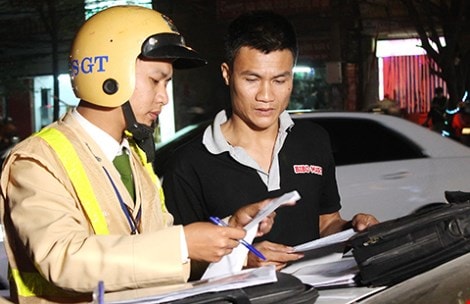 |
| Hanoi traffic police fine a traffic violator. Photo: Tuyen Phan |
Vehicle requisition causing damage must be compensated
- According to Circular 01, traffic police are allowed to requisition means of transport, means of communication, digital devices such as video cameras, cameras or phones... So in what situations are traffic police requisitioned?
+ Clause 15, Article 15 of the Law on People's Public Security stipulates that the police have the right to mobilize and requisition means of communication, means of transport, other means and people using and controlling the means according to regulations.
Specifically, the cases of requisition are urgent situations to protect national security, social order and safety or to prevent consequences of damage to society that are happening or are at risk of happening. For example, in the case of Traffic Police Team 5 in Hanoi being dragged, the Traffic Police have the right to requisition vehicles to chase the driver.
- If people do not comply, will they be considered as resisting law enforcement officers? In addition, when requisitioning damages people's property, will they be compensated, sir?
+ If the person whose vehicle is requisitioned does not comply, depending on the consequences, nature and extent, he/she will be subject to administrative or criminal sanctions. For example, in an emergency situation where a drug criminal needs to be pursued, the police will requisition the vehicle but the owner does not agree, and will be forced to do so. If the vehicle owner intentionally obstructs, he/she may be arrested.
When requisitioning, the police must clearly state the purpose and ask for the people's cooperation. The unit that requisitions must return the vehicle to the people. If the vehicle is damaged as a result of the requisition, the requisitioning unit must compensate.
- People have the right to monitor traffic police by filming and taking photos, but what if traffic police use their right to requisition to delete negative data and evidence, sir?
+ The regulations are very clear. Traffic police have the right to requisition in urgent cases, but if they requisition incorrectly, they will be severely punished.
- Nowadays, the phone is not only a means of communication but also contains a lot of personal information such as emails, photos, etc. So if the traffic police confiscate the phone, is it a violation of personal rights?
+ This is an urgent situation as prescribed by law, so it will not be handled. To avoid the risk of damage to the State and society, it is impossible to avoid causing small damage for prevention. However, as I mentioned, if the requisition damages property, the people will be compensated.
Thank you.
Insurance will cover damage to the requisitioned vehicle. According to Mr. Le Hong Hung, Deputy General Director in charge of appraisal, compensation, legal affairs and investigation of Vien Dong Insurance Joint Stock Company, the insurance company will still pay insurance when the customer's vehicle is damaged due to requisition by a state agency. "The insurance principle is that if an accident occurs in reality, the driver is not drunk, and uses the vehicle legally, if damage occurs, compensation will be paid. Using a requisitioned vehicle is considered legal use, even if the vehicle enters a prohibited road to perform a task, it is also legal practice" - Mr. Hung said. So, in theory, insurance must be paid. In terms of sentiment and morality, the company should pay even more insurance. Because the requisition of personal property to perform public service is more important, it can save more people, more property, and maintain social order and safety. If the insurance does not pay, there is a possibility that the customer will cause obstacles, prevent the requisition, leading to unfavorable state public service. However, the requisitioning unit must have obligations when the property is damaged. “We have not had to pay insurance for any case of damage caused by requisition. But if there is any, the insurance company will pay insurance to the vehicle owner first. Then, based on the situation and nature of the requisition, the insurance company will request the requisitioning agency to pay back or support this insurance,” Mr. Hung said. Similarly, Mr. Pham Truong Khanh, Marketing Director of Liberty Insurance Company, also affirmed that the company will pay insurance if personal cars are damaged, have accidents, or are damaged due to State requisition. According to the general principle in the world, if there is damage, the insurance company will pay the customer and then work with the third or fourth party to clarify the responsibilities of the parties. The insurance company cannot bring in the third or fourth party to refuse insurance. Requisitioning property for public purposes is not a case of excluding insurance liability, so the customer is still insured. Q.AS noted Abuse of power will be dealt with. Normally, the requisition needs to be recorded, but in some urgent cases, chasing hot traces, it can be recorded temporarily and then resolved later. However, traffic police must state their full name, position, and work unit, state their purpose, and ask for the vehicle owner's cooperation and help in completing the task. Any case of impersonating traffic police and abusing this authority will be subject to criminal prosecution. Lieutenant Colonel NGUYEN QUANG NHAT Rarely requisition property The provincial police have deployed a new circular to local police. The fact that traffic police can be requisitioned in necessary and urgent cases has been regulated before. This is not a new point. In fact, we rarely requisition people's vehicles while on duty. Because currently the vehicles equipped for the traffic police force are complete, responding to situations such as accidents, natural disasters, incidents. In some cases when there is an accident, the traffic police have requested support vehicles to take the victims to the emergency room and the people are very ready. Colonel NGUYEN VAN NINH,Head of PC67 Traffic Police Department, Ba Ria-Vung Tau Province Police K.Lghi People are not allowed to see the plan. Sir, are people allowed to see the traffic police's plans and topics? + When stopping a vehicle, the traffic police must notify the violation. People have the right to ask what the violation was and prove that they did not violate the law. They also have the right to complain and sue if they do not agree with the penalty decision. The plan and the topic belong to the functions and tasks of the traffic police. The inspection belongs to the inspection and supervision work of the people's police, not the responsibility of the people. People have the right to complain and sue, but they do not have the right to demand to see the plans and documents of the traffic police. Because administrative law is a command, a management and an execution. Lieutenant Colonel NGUYEN QUANG NHAT |
According to phapluattp.vn

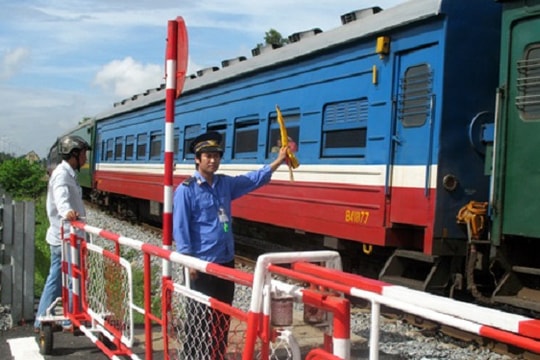
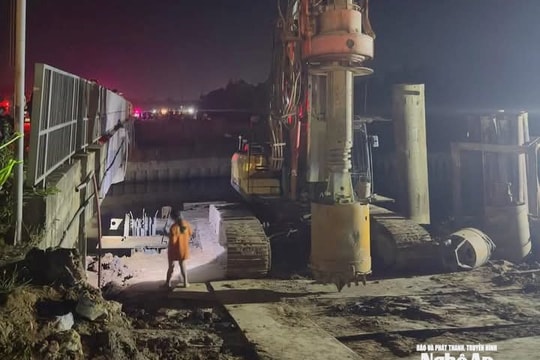
.jpg)
